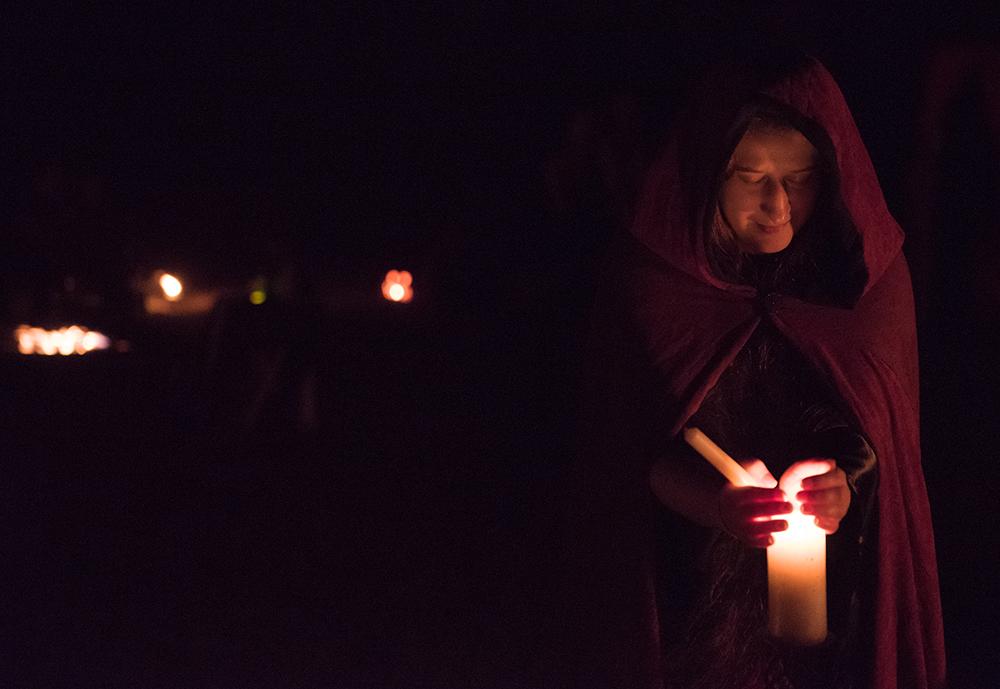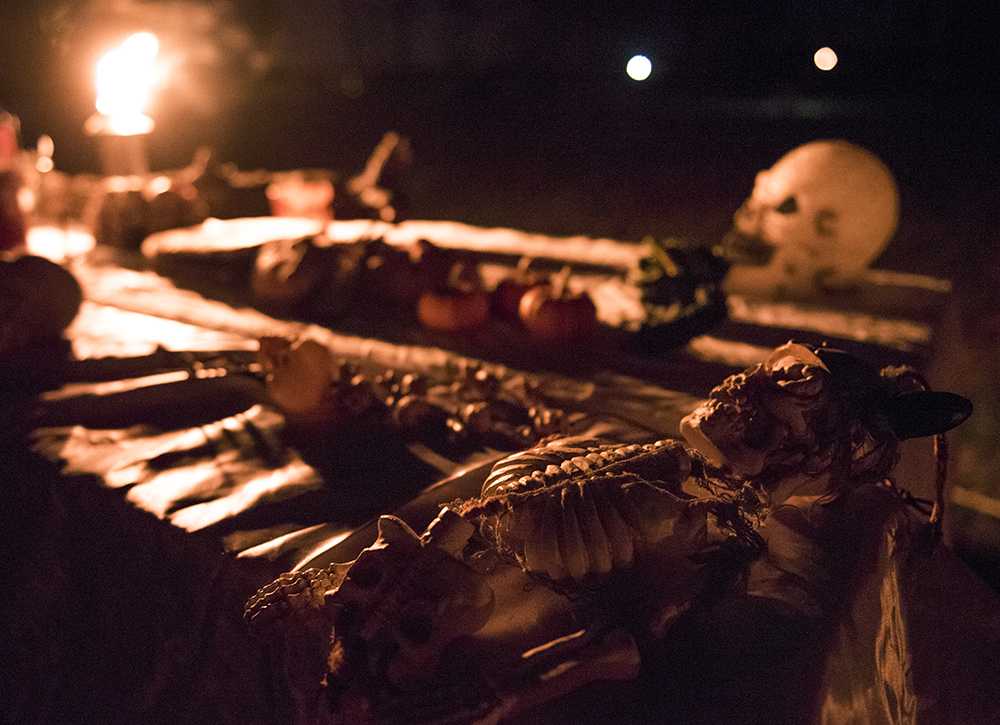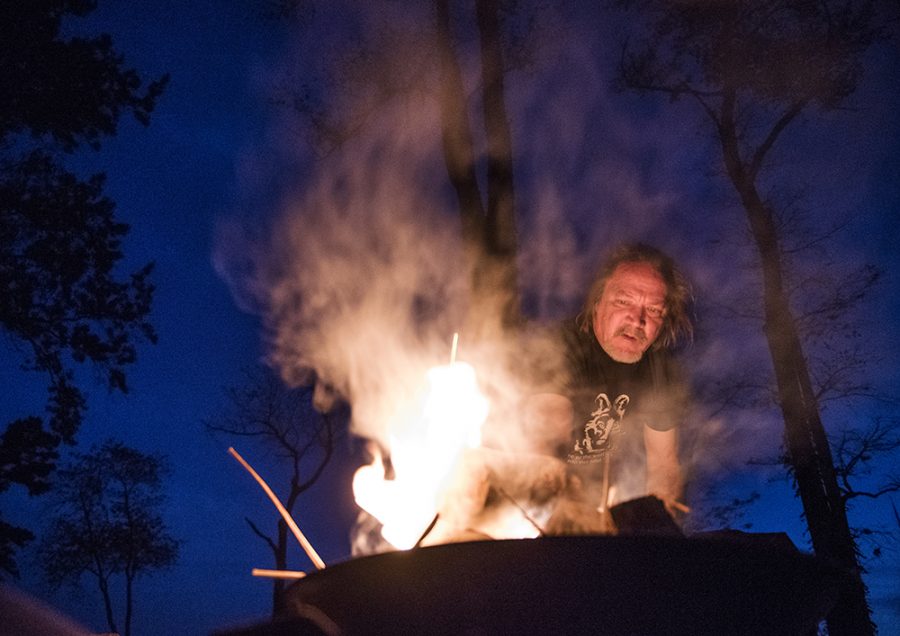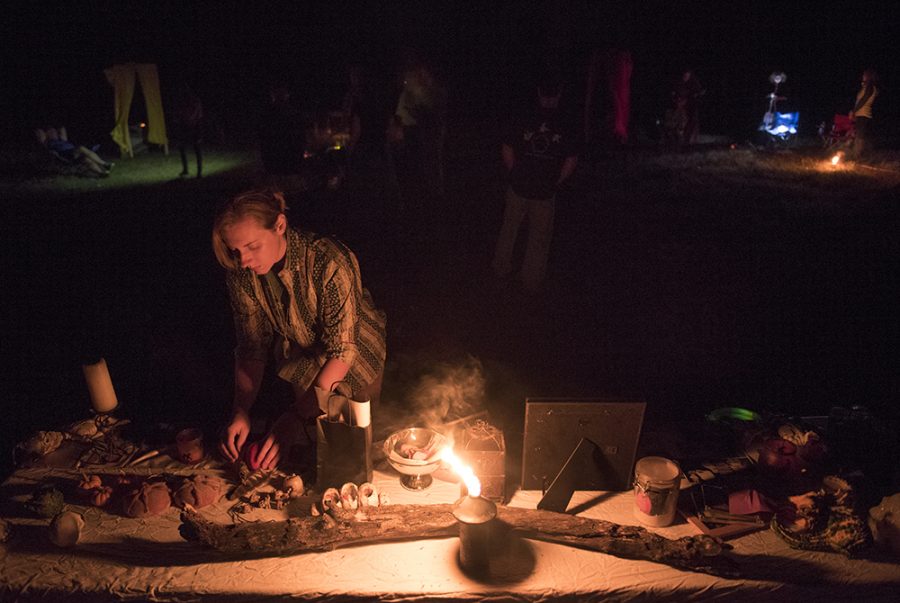Pagans of southern Illinois celebrate the new year, remember lost loved ones
Auto technician and volunteer fire fighter George Cook, of Evansville, throws kindle onto the Spirit Fire on Saturday, Oct. 29, 2016, during the Southern Illinois Pagan Alliance’s Samhain celebration at Crab Orchard Campground. Cook has been a member of the alliance for eight years and identifies as an eclectic Pagan. “I love that Paganism is an earth-based religion that brings all sorts of people together,” Cook said. “It’s just like when Christians came over here, Native Americans were classified as Pagans because they didn’t believe in the Christian God, but they worshipped Mother Earth and Father Sky. They took care of their land and the land provided for them. That’s the path I follow.” During the ceremony, participants used the Spirit Fire to banish internal aspects of their life they wished to let go of, Cook said. (Morgan Timms | @Morgan_Timms)
October 30, 2016
As the steady drumbeat drowned out cricket chirps and rustling leaves, members of the Southern Illinois Pagan Alliance filed one by one into a roped-off circle to begin Samhain.
Participants within the circle individually approached an ancestral altar, which was covered with pictures and keepsakes meant to memorialize departed family, friends and pets. Crying, gesturing, praying, laughing — each had their own private moment at the altar to reminisce and eulogize those they lost in the past year.
“People think we’re a cult or we worship the devil,” said Emmalie Hall-Skank, a junior from Streamwood studying interior design. “There’s a lot of negative perceptions about it.”
Advertisement
Samhain, one of eight pagan holidays observed throughout the year, celebrates the start of a new year, commemorates harvest time and pays homage to ancestors and lost loved ones. For pagans, this time of year is when the veil between the worlds of the living and dead are thinnest, allowing for easier communication with those who have passed away.
Crab Orchard Campground was the site of the annual pagan ritual organized by the alliance in observance of the religion’s new year and Hall-Skank was the “quarter caller” for the earth altar during the ritual. During the ceremony, she called upon the “powers and energies of earth” and asked them to stand guard over the ritual and its participants.

Tara Nelsen, founder of the Southern Illinois Pagan Alliance and a 2002 SIU graduate, said the alliance has been around since 1998. The need for one arose, she said, when she saw an ad in a local newspaper from an Evangelical-Presbyterian church displayed advice on “how to battle paganism with the word of God.”
Nelsen said she helped organize a debate between the minister of the church and pagans from the area. Enough pagans came forth afterward that Nelsen decided to form a group so they could gather to celebrate their beliefs. Like any other religion, she said, it is a spiritual path.
“We just worship outside instead of a church,” Nelsen said. “We follow the cycles of nature instead of a book.”
During the gathering, ritual-goers wrote on notecards which aspects of their lives they wanted to banish coming into the new year. These cards were taken to one of four elemental altars within the circle.
Nelson said the altars represent the four cardinal directions and elements. North is earth, east is air, west is water and south is fire.
Advertisement*
The earth altar contained a pot of dirt for the burial of cards. For the air altar, papers were tied to a dreamcatcher and for water, cards were immersed in water. The fire altar housed a lit candle to set the cards ablaze.
Card remnants from these altars will be taken to the Mississippi River to carry away negativity from the lives of those who wrote them, physically and spiritually, Nelsen said.

Hall-Skank, who grew up in a Christian household, was familiar with the religion’s focus on nature through her pagan aunt. When she was 12, she decided to research it further and found it fit with her beliefs about the world more closely than did Christianity.
She said her parents don’t stop her from practicing paganism, but rather operate on more of a “don’t ask, don’t tell” policy.
“I’m still expected to go to church with them when I’m home, but I’m allowed to have altars in my room,” Hall-Skank said.
Though Hall-Skank makes do with LED candles in her dorm room altars instead of real ones, she said she isn’t deterred and maintains a handful of these “centers for spiritual energy” in her campus residence.
Pagan alliance board member Ross Bauer — president of the Gaia House Interfaith Center board of directors — agreed that there are misconceptions about the pagan faith.
“People think that pagans dance naked in the woods at these things,” Bauer said. “I’ve never seen anyone actually practice that way.”
Instead, Bauer said paganism is about putting good into the world and connecting with the earth.
The pagan alliance provides a community of support for pagans who may be afraid of any negative backlash, which Bauer likened to “coming out of the closet” for spirituality.
Alliance member Meagan Jarrett discovered paganism 17 years ago when she was a sophomore in high school. Though the Du Quoin native came from a Christian family, Christianity never made sense to her.
Paganism is highly personalized and accepting, Jarrett said. Its followers can choose to worship whichever deities and practices they prefer. She focuses on leading a positive life and tries to raise her two young sons the same way.
“As long as you’re not hurting anybody, to each their own,” she said.
Staff writer Marnie Leonard can be reached at [email protected] or on Twitter @marsuzleo.
To stay up to date with all your southern Illinois news, follow the Daily Egyptian on Facebook and Twitter.
Advertisement









